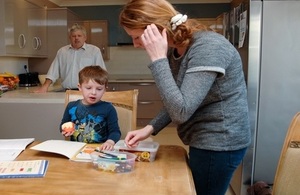New adoption inspection arrangements published
For an authority to be outstanding, delays in adoption must be tackled.

Only local authorities that ensure all children identified for adoption are placed within 12 months, unless there are exceptional circumstances, are likely to achieve an ‘outstanding’ judgement from Ofsted under new adoption inspection arrangements published today.
Age is the most significant indicator of a successful adoption; the younger a child is placed the better the outcomes. Delays in adoption can have severe impact on children’s health, development and ability to make new meaningful attachments and can impair their chances of enjoying a successful adult life. Inspection will have a key focus on how quickly adoption agencies place children when adoption is in their best interest.
Along with the new adoption inspection arrangements, Ofsted is also launching the new inspection framework for fostering and revisions to the children’s homes framework introduced a year ago. Together these frameworks will place even more emphasis on what makes the most difference and has the greatest impact on the lives of children who are in care.
John Goldup, Deputy Chief Inspector said:
‘Everything we are publishing today is about raising our expectations for our children. Under these frameworks, it will be much harder to get a ‘good’ or an ‘outstanding’ judgement from inspectors. It is essential that children in care, often the most vulnerable, get the very best support to have a happy, stable and fulfilling childhood. That is why we want to raise standards further and focus on what real difference is being made to children’s lives.
‘Our scrutiny of delays in the adoption process will help focus and bring forward a smooth and quicker adoption process. The earlier children are identified for adoption and placed with a family the better the chances that adoption will be successful.’
In addition to looking at delays, inspection will look at whether adoption has been considered as an option for all children in local authority care. Inspectors will look at evidence that adoption has been considered early in the planning process and not as a last resort.
Separation from siblings has been a continuing concern for children in care. As a result, when inspecting adoption services, inspectors will look at whether children identified for adoption are able to be adopted together with their siblings wherever this is possible. Minimising the separation of children from their siblings will also be the aim for children who are fostered.
Delays in the recruitment and assessment of adopters will also be considered under the new framework. Inspectors will look at the vetting process, how long it takes and the support provided for those who adopt.
For children who are fostered, the new framework will help to ensure that the number of placements are reduced by looking at how well children’s needs are matched with the foster carers and what support is provided to both the child and carers to make placement a success. The focus of inspection will be on the difference the fostering service has made to children’s lives and how it ensures that outcomes are the best possible for each child.
For children’s homes inspections, the criteria for being judged as a good or outstanding service have been strengthened, following a review of the first year’s implementation. The framework continues to emphasise that inspectors will spend the majority of their time talking directly with children, young people and families and observing practice on the ground. To be judged outstanding, leaders and managers will have to be able to demonstrate sustained success in achieving exceptional outcomes for the most challenging young people.
The new frameworks will be implemented in April this year.
Notes to editors
- Inspection of local authority and voluntary adoption agencies, Inspection of local authority fostering services and independent fostering agencies and Inspection of children’s homes frameworks and their accompanying evaluation schedules are available on Ofsted website.
Media enquiries
Clive House
70 Petty France
London
SW1H 9EX
Email pressenquiries@ofsted.gov.uk
Monday to Friday, 8:30am to 6pm 0300 013 0415
Out of hours duty press officer 07919 057 359